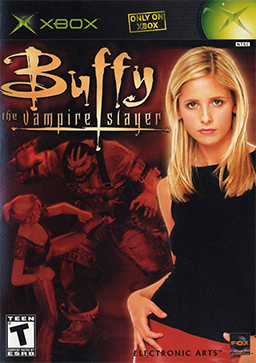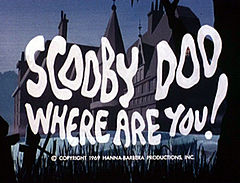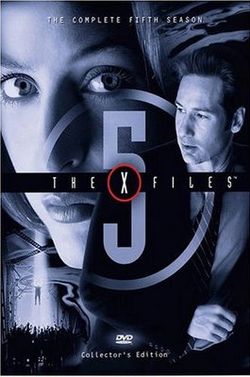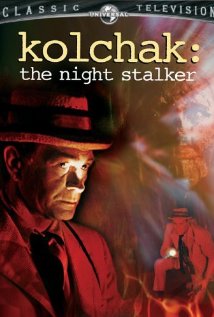Weird of Oz: Scooby Meets Buffy (a Postscript)
 Last week’s post was prompted by a term I used fleetingly in my review of the new Scooby-Doo series two weeks ago: “post-Buffy.” Rather than go off on a tangent explaining what I meant by that in the midst of discussing Scooby-Doo! Mystery Incorporated, I promised any interested readers that I would devote a whole column to this concept of “post-Buffy” in my next installment.
Last week’s post was prompted by a term I used fleetingly in my review of the new Scooby-Doo series two weeks ago: “post-Buffy.” Rather than go off on a tangent explaining what I meant by that in the midst of discussing Scooby-Doo! Mystery Incorporated, I promised any interested readers that I would devote a whole column to this concept of “post-Buffy” in my next installment.
So last Sunday I posted “Weird of Oz Considers Postbuffyism,” primarily to reflect on how Buffy the Vampire Slayer (1997-2003) influenced later television.
 What caught me off guard was the pushback I got to my assessment of Buffy and its significance in television history. Of course, one or two people questioned the merits of the series itself — that’s okay; some people just don’t dig Buffy. Others asserted there were earlier series already using narrative innovations to weave multiple plot threads over several seasons, which I did acknowledge — my premise was not that Buffy was the first, only that it generally has been one of the most influential.
What caught me off guard was the pushback I got to my assessment of Buffy and its significance in television history. Of course, one or two people questioned the merits of the series itself — that’s okay; some people just don’t dig Buffy. Others asserted there were earlier series already using narrative innovations to weave multiple plot threads over several seasons, which I did acknowledge — my premise was not that Buffy was the first, only that it generally has been one of the most influential.
But then one commenter brought up a series that gave me pause: The X-Files. Here was a series to which much of what I said regarding Buffy could also apply, and which has arguably been as influential on genre television. This prompted me to formulate a response that itself grew into a post-script or a sequel to the original post, but before I get to that I’d like to take a moment to tie the last two posts more closely together: to explain why the new Scooby-Doo series got me to thinking about Buffy in the first place.
That the writers for Scooby-Doo! Mystery Incorporated (2010-present) have been influenced by Buffy is often made explicit with direct allusions (although, granted, the new Scooby-Doo drops a pop-cultural reference about every thirty seconds). But it goes beyond these obvious allusions: As Michael Penkas noted in his comment to the post, “I’ve spent the last few weekends watching episodes of Mystery Inc and Buffy. A lot of the same themes pop up in both series.” It is very clearly patterned on the Buffy storytelling style, albeit skewed to a younger audience (no one ever dies in Scooby-Doo, unless the death is implied or happened in the past).
 Interwoven with the episodic capers is an overarching plot involving a “Big Bad.” This narrative arc asserts itself into the stand-alone mysteries, usually with cryptic messages from the enigmatic Mister E. There is long-term continuity, with incidental characters introduced in early episodes who take on wildly different but significant roles in later ones (although the meta- nature of the writing results in “retconning” that is intentionally obvious and purposefully outrageous, eliciting more than one surprised snort of appreciative laughter from this viewer). The conflicts that arise out of evolving relationships within the group are also vintage Buffy: inter-Inc. relationships blossom, are strained, fail miserably, and threaten to break up the gang. Back stories and family members are introduced, bringing with them further sources of dramatic tension and plot twists. Daughter, this is not your father’s Scooby-Doo. Actually, this Scooby-Doo is more for your father than the one he grew up with.
Interwoven with the episodic capers is an overarching plot involving a “Big Bad.” This narrative arc asserts itself into the stand-alone mysteries, usually with cryptic messages from the enigmatic Mister E. There is long-term continuity, with incidental characters introduced in early episodes who take on wildly different but significant roles in later ones (although the meta- nature of the writing results in “retconning” that is intentionally obvious and purposefully outrageous, eliciting more than one surprised snort of appreciative laughter from this viewer). The conflicts that arise out of evolving relationships within the group are also vintage Buffy: inter-Inc. relationships blossom, are strained, fail miserably, and threaten to break up the gang. Back stories and family members are introduced, bringing with them further sources of dramatic tension and plot twists. Daughter, this is not your father’s Scooby-Doo. Actually, this Scooby-Doo is more for your father than the one he grew up with.
Buffy Summers and her pals affectionately referred to themselves as “The Scooby Gang” or just “The Scoobies.” Now, ten years after Buffy went off the air, Scooby-Doo has been transformed by the influence of Buffy. In a case of things coming full circle, the “Scooby Gang” imparted new life into the original Scooby Gang.
 Okay, back to the surprising debate that rose in the comments section of last week’s post, and the further consideration on my part sparked by someone bringing up The X-Files. I did respond, but for those readers who typically do not have time to follow the banter in the comments section of old posts, and who therefore may have missed it, here is what else I had to say…
Okay, back to the surprising debate that rose in the comments section of last week’s post, and the further consideration on my part sparked by someone bringing up The X-Files. I did respond, but for those readers who typically do not have time to follow the banter in the comments section of old posts, and who therefore may have missed it, here is what else I had to say…
Doesn’t happen very often that my reply to a comment on my blog post grows into the equivalent of another blog post.
But I have to admit, I had to mull over the point raised about The X-Files. Ran it by my buddy Gabe, who helped me flesh out my thoughts and articulate a response.
You noted you’ve never seen Buffy, mcglothlin.13, but that doesn’t get me off the hook. The question you raise is valid: Aren’t the aspects of Whedon’s series that I most trumpeted just as applicable to The X-Files?
Without getting into the weeds of Buffy and distinctions between the two series, I can address your point by considering how well my argument regarding long-term narrative and layers of story fits The X-Files. Put another way, if we substituted The X-Files for Buffy in my premise, would my thesis still fit? And if it doesn’t fit, you must acquit.
 Right off the bat I’ll acknowledge the impact of The X-Files and its hallowed place in genre television. And I’ll start by noting the most effective narrative improvement Chris Carter made over earlier shows that were the biggest influences on him. Carter always cites, first and foremost, Kolchak: The Night Stalker. Kolchak was a newspaper reporter who, in two-made-for-TV movies (The Night Stalker, 1971, and The Night Strangler, 1973), found himself uncovering evidence that the culprits behind serial killings in Chicago and Seattle are actually vampires. Those stand-alone mysteries spawned a television series (1974-1975), but the set-up soon strained all credibility. Not because of the supernatural elements, but because of the increasingly unlikely coincidence that this one beat reporter would always be uncovering some kind of monster behind every crime he happened to investigate. Coincidence that rivals the Die Hard movies or any long-running detective series where the protagonist works in some field wholly unrelated to homicide, but just conveniently happens to find a murder has just occurred virtually everywhere he/she goes.
Right off the bat I’ll acknowledge the impact of The X-Files and its hallowed place in genre television. And I’ll start by noting the most effective narrative improvement Chris Carter made over earlier shows that were the biggest influences on him. Carter always cites, first and foremost, Kolchak: The Night Stalker. Kolchak was a newspaper reporter who, in two-made-for-TV movies (The Night Stalker, 1971, and The Night Strangler, 1973), found himself uncovering evidence that the culprits behind serial killings in Chicago and Seattle are actually vampires. Those stand-alone mysteries spawned a television series (1974-1975), but the set-up soon strained all credibility. Not because of the supernatural elements, but because of the increasingly unlikely coincidence that this one beat reporter would always be uncovering some kind of monster behind every crime he happened to investigate. Coincidence that rivals the Die Hard movies or any long-running detective series where the protagonist works in some field wholly unrelated to homicide, but just conveniently happens to find a murder has just occurred virtually everywhere he/she goes.
Carter wanted to do a “monster of the week” show with a premise that justified the protagonists uncovering monsters each week. Positing a somewhat independent, somewhat rogue FBI special agent who stakes out his own claim on all the bizarre, unsolved cases that get filed in the “X-Files” was an inspired move. Agent Mulder, with his skeptical partner Scully, has the resources and authority of the bureau at his disposal, and his own obsessions, coupled with his superiors’ willingness to humor him and look the other way, provide the perfect framework for his regular run-ins with the otherworldly.
And, yes, beyond the self-contained monster-of-the-week mystery of each episode, there was an over-arching, unfolding narrative—what came to be known as The X-Files’ “Mytharc” with its government alien conspiracies and the recurring character of the Smoking Man. This larger narrative arc grew ever more complex and convoluted over the nine-year course of the series (to the extent that some viewers began to drop out even before Duchovny called it a day—Whatever the hell was going on with the aliens and secret impregnations is still not all that clear, even after two subsequent feature films).
But I would say that these two concurrent levels of narrative were still quantitatively less than what Whedon and company did with Buffy and Angel—the narrative threads of The X-Files were not quite as fully integrated. As Gabe put it, The X-Files almost felt like a hybrid—you tuned in from week to week and you were either going to get a stand-alone episode or you were going to get an alien-cover-up (or “Mytharc”) episode.
That said, its (not-always-seamlessly meshed) series-long narrative unquestionably distinguishes The X-Files as belonging alongside the shows other commentators here have noted (Babylon 5, Xena, Homicide — and I’ll add one more that happens to be one of my favorites: Twin Peaks) in driving the TV evolution of the ‘90s. To further push the evolution metaphor, one theory has it that new adaptations may occur in sudden leaps and even develop independently. Several TV shows began pushing the narrative possibilities of television during the ‘90s; this sudden cluster (as C-Foxessa describes it) may have just been the Zeitgeist, creating a fertile period of experimentation that would pave the way for a golden decade that saw The Sopranos, The Wire, Lost, Six Feet Under, BSG, and so many other landmark series that it’s hard to keep up with all of them.
I never said Buffy was the first. Why, then, did I single it out as a benchmark, as a paragon of these storytelling trends?
Obviously I am a fan of the series; others may be completely underwhelmed (or “left cold” by Buffy, as James May wrote). But love it or hate it, we are just viewers and reviewers. When it comes to the question of influence on other television producers, this can be objectively tested quite apart from my opinion or yours. And what I noted is that Ronald D. Moore (BSG) and Russell T. Davies (Doctor Who, Torchwood), arguably two of the most important names in sci-fi television of the last decade, have both singled out Buffy specifically as having a profound influence on their own work.
Although there has yet to be a comment posted here that agrees with me, I’m not an outlier in this opinion. Just a few minutes ago, I came across an article on the A.V. Club published only last year that contends Buffy “would become one of the most influential TV dramas of all time” and that “by the end of its seven seasons, Whedon and Buffy had reinvented the face of television.” Read the full article here.
By the way, ignore the 1992 Buffy film. Whedon had little to do with that. If you’ve never seen an episode of Buffy, and if you are thinking of checking it out, I envy you. You’re going to see “Hush” for the first time, and “Restless,” and “Once More, With Feeling,” and “The Body.” Oh, “The Body.” Let me quote Ian Shuttleworth on that: “Any sneerer of Buffy in particular or genre work should simply be sat down in front of a television and told to shut up for three-quarters of an hour while they are shown ‘The Body’; their awestruck silence afterwards may be taken as recantation or apology.” I heartily second that opinion.
One way in which Buffy was very different than the X-Files is that Buffy was much more of an ensemble show, whereas X-Files was only really ever about Scully & Mulder (well, and later what’s-his-name but I haven’t seen those episodes yet) with Skinner as the only major recurring character.
(Which, as I think about it, means that Supernatural is kind of a weird X-Files/Buffy hybrid where you have the Buffy-style season arc but the X-Files-style only two main characters.)
My my! I didn’t intend for my (passing) comment to be a challenge. Your post here fills out and better explains your former claim concerning Buffy. Again, I’ve never seen an episode of Buffy but I am a huge X-Files fan and I think your characterization (hybrid: monster of the week or mytharc) is spot on. In fact, on one of the original DVD commentaries or interviews Christ Carter admits as much. Just thought I’d mention this since it seems to bolster your claim.
mcloghtlin.13: I, for one, am grateful you left that passing comment! I have 52 of these slots a year to fill, and your question got me thinking about The X-Files and where it and Buffy fit in relation to each other, which, of course, led to this week’s post.
Thanks for passing along that tidbit from Carter’s DVD commentary. When I originally watched the series, I was still watching it on VHS, so no commentaries…
Joe H: Great point — “…Buffy was much more of an ensemble show, whereas X-Files was only really ever about Scully and Mulder…” with the gradual addition of a few recurring, minor supporting characters (including the Lone Gunmen, who, as I recall, had their own spin-off series).
Incidentally, your description of Buffy as an ensemble show happened to jibe with virtually the same observation a friend of mine made in an email to me after he read the post–he characterized Buffy as developing a “double handful” of characters.
I’ve just begun Supernatural, and I’m looking forward to the journey. From what I’ve been informed by longtime fans, I’m expecting that it gradually becomes more epic and mythic (a la Buffy), while continuing to be primarily about the two brothers (a la X-Files).
One crucial difference between Buffy and X-Files is that Whedon eventually gave satisfying answers to nearly all of the mysteries he set up, whereas Chris Carter was always holding out. It reached the point where the lack of comprehensible answers in X-Files began to feel more like an artifact of network profitability than an organic part of the story. Anytime the characters got too close to understanding something, the goal posts had to move so that the cash cow series could be prolonged until it stopped being profitable. I loved the early seasons, but dropped out from fan fatigue. The first film was supposed to contain revelations, but instead in contained cyphers as placeholders where the writers could have put revelations but decided not to. I wanted to stick with Mulder and Scully to the end, but I caught on that there was never going to be a real end, just a time when new cyphers stopped being provided.
Contrast this with the scene in which the delegation of Watchers finally tells Buffy what Glory really is. Contrast it with the Buffy series finale. Whedon and his crew were willing and able actually to deliver on what they promised the audience, and to deliver in ways that both satisfied and surprised.
Sarah, I think that is a salient difference too, and I share your sentiment. I became a huge fan of The X-Files about three seasons in, went back and caught up from the beginning (renting VHS tapes from my local video store–I think there were two or three episodes per tape). But I was also one of the ones who “dropped out from fan fatigue,” sometime around season six or seven. Too often I’d tune in to have the reaction, “Not another alien episode. Reveal nothing, further obfuscate everything.” That said, it did deliver several seasons worth of gripping entertainment, and some of the standalone episodes are little masterpieces of horror/suspense.
I’d like to bring another voice into the discussion. Frederic S. Durbin (who had a story in the last print issue of Black Gate, but you may also recognize him as the author of the Arkham-House novel Dragonfly or the recent YA fantasy The Star Shard) shared some thoughts via email after reading this week’s post. He hasn’t had the chance to register here to leave a comment, but with his permission I’m passing along a snippet of that email he jotted down in haste, specifically a couple paragraphs about The X-Files and about the reverence for Buffy held by some prominent fantasy authors:
“Although the interplay between Mulder and Scully was fun, that was really ALL that show had going for it.”
I think that’s a mass oversimplification. X-Files was a very diverse show. For example, it’s one of the few shows that could mix in comedic episodes along with horror and serious drama episodes. Also, the cadre of writers for that show have gone on to do some very impressive things. Most famously, Vince Gilligan of Breaking Bad fame, was a regular writer for X-Files as well as its spinoff The Lone Gunmen.
I could go on. Again, I’ve never seen an episode of Buffy and I’m sure it was a great show. But let’s not piss on X-Files in an effort to laud Buffy. There are stranger things than our Whedonian philosophies can dream up.
“But let’s not piss on X-Files in an effort to laud Buffy.”
mcglothlin.13: That is a valid point. For myself, I reiterate my earlier notes: X-Files had me hooked for several seasons (I even bought one of those X-Files Episode Guides back in the mid-90s; it only covered the first two or three seasons though, the series was so young). And I think a couple of the stand-alone episodes are still among the scariest/creepiest programs for television I’ve ever seen. (Also, what a gem that UFO-conspiracy-theorist spoof was–the episode where one of the men-in-black is Alex Trebek?) It has also, obviously, been hugely influential (I think of the series Fringe, most recently).